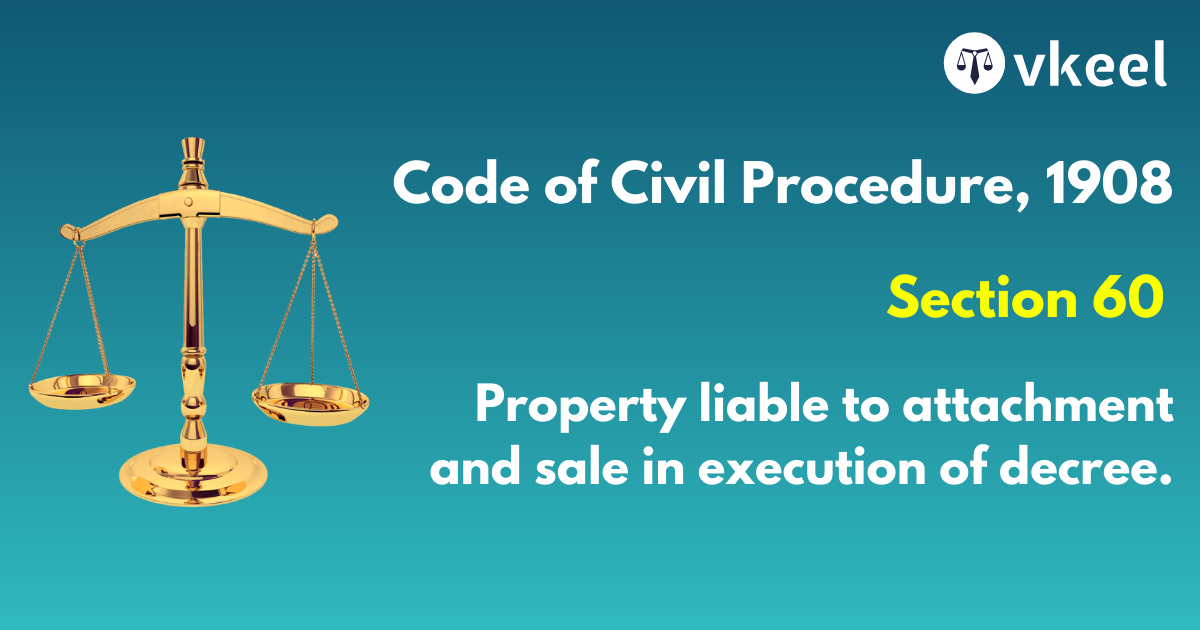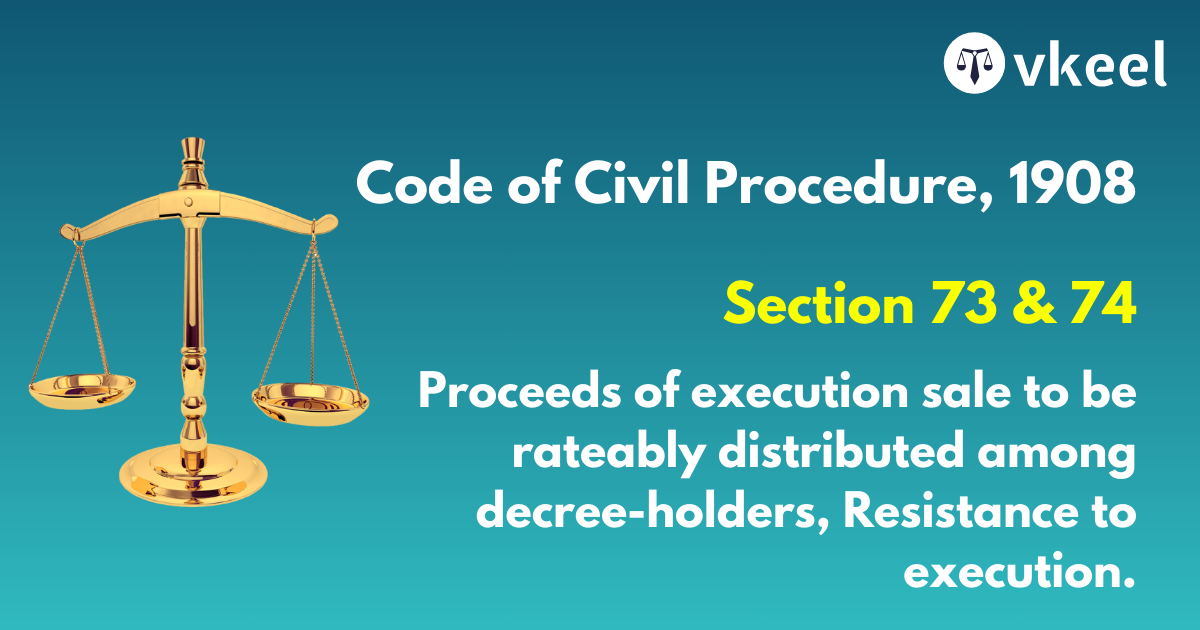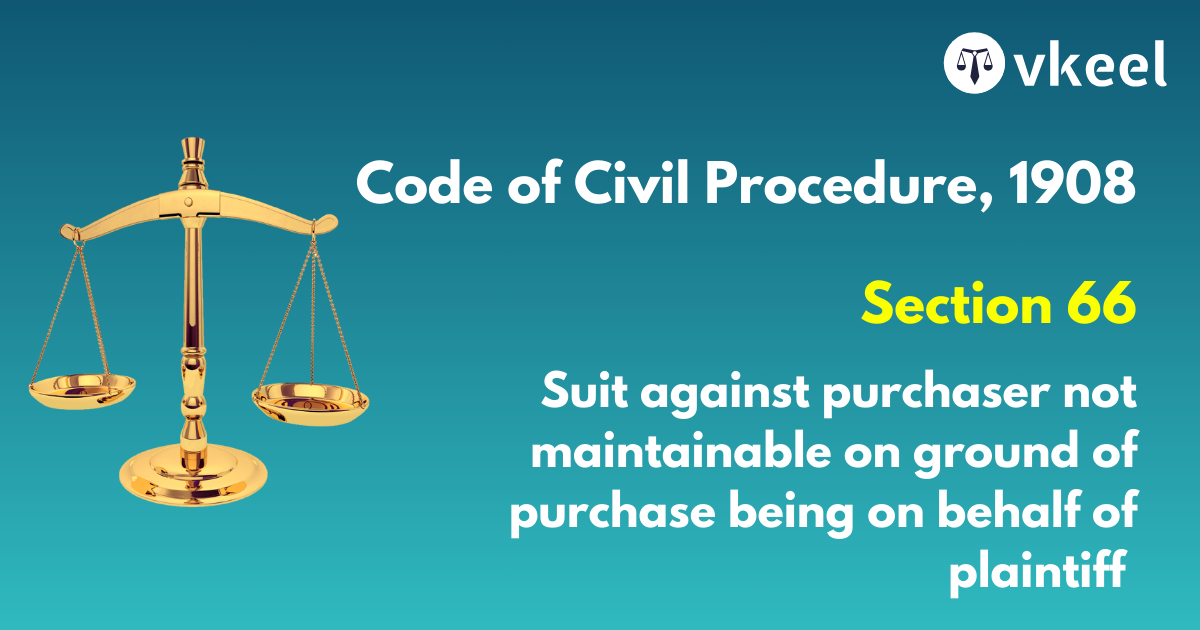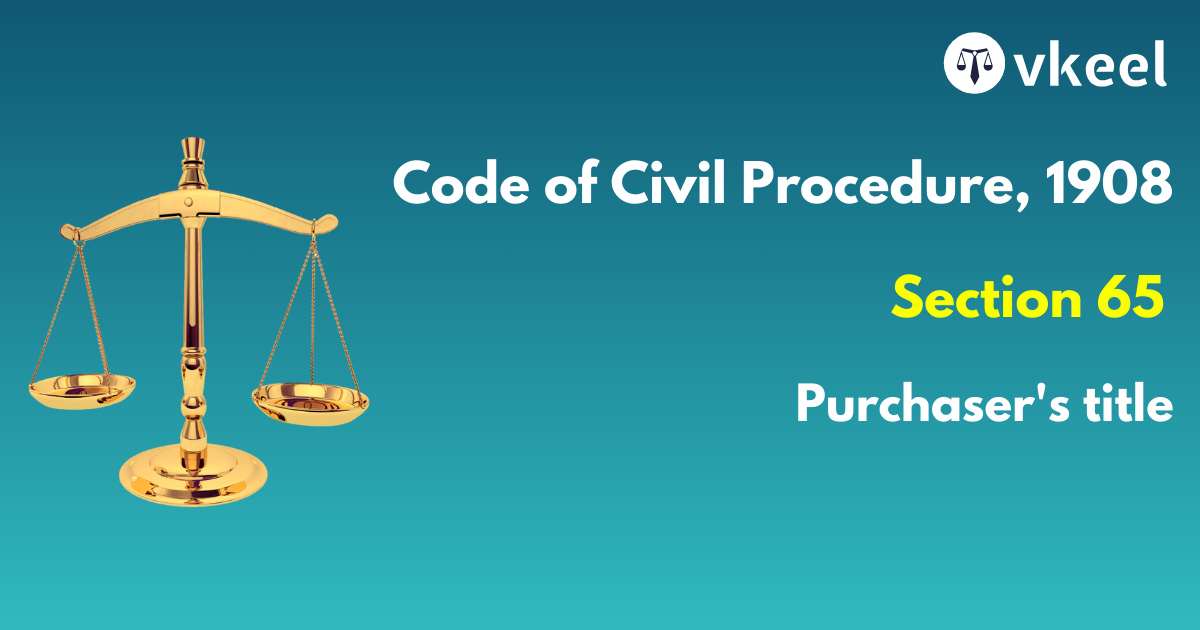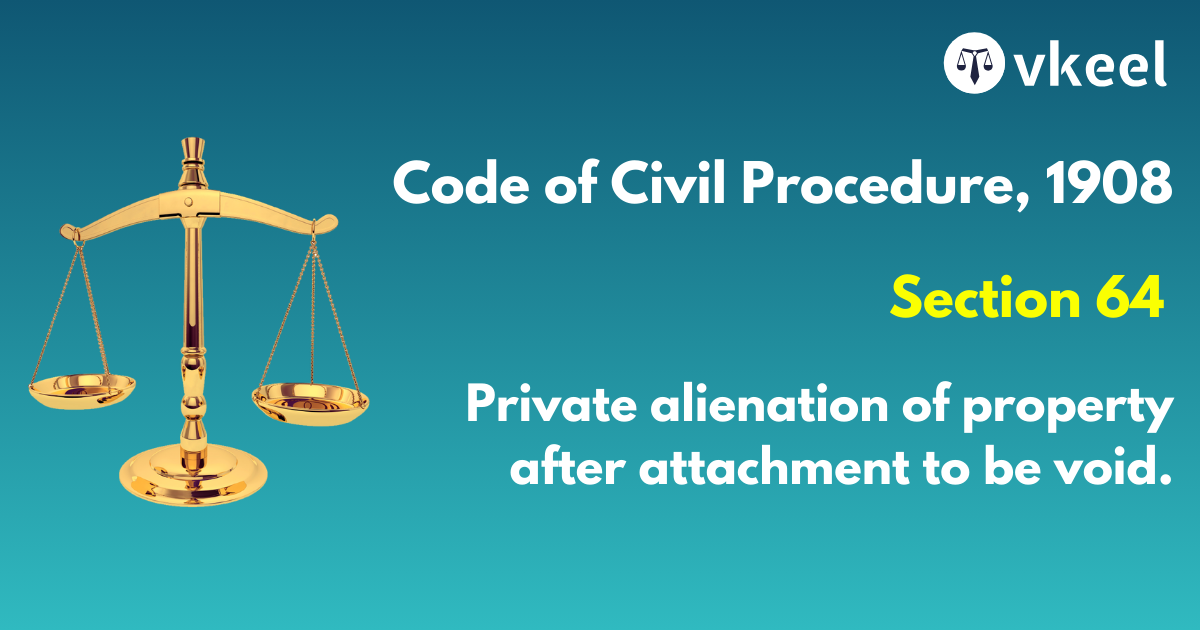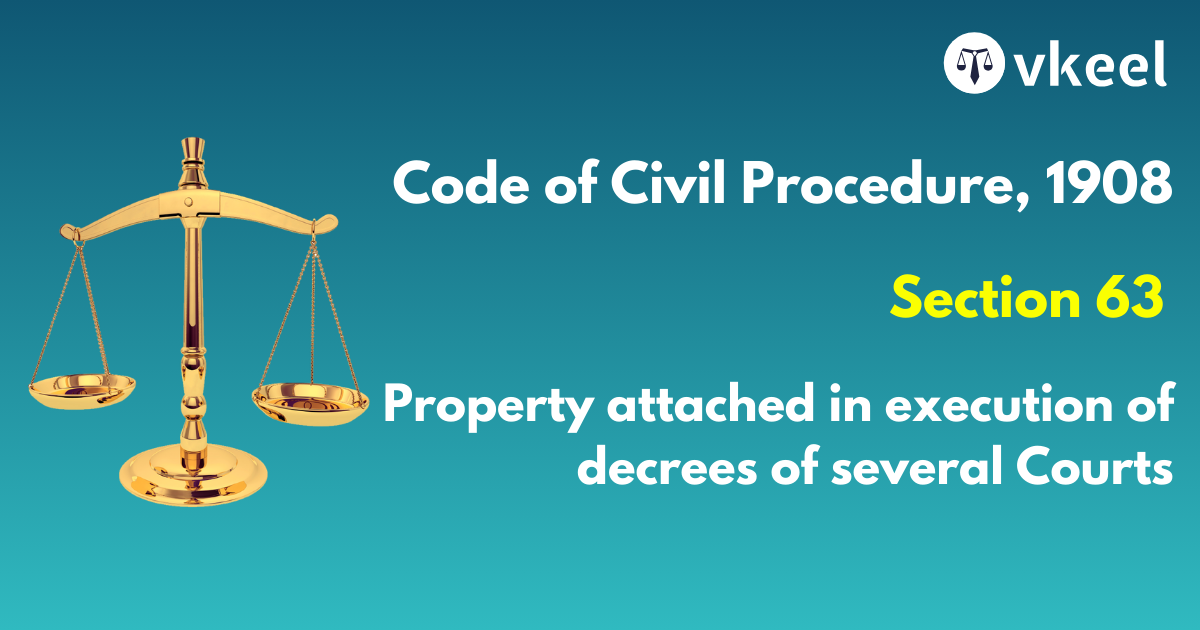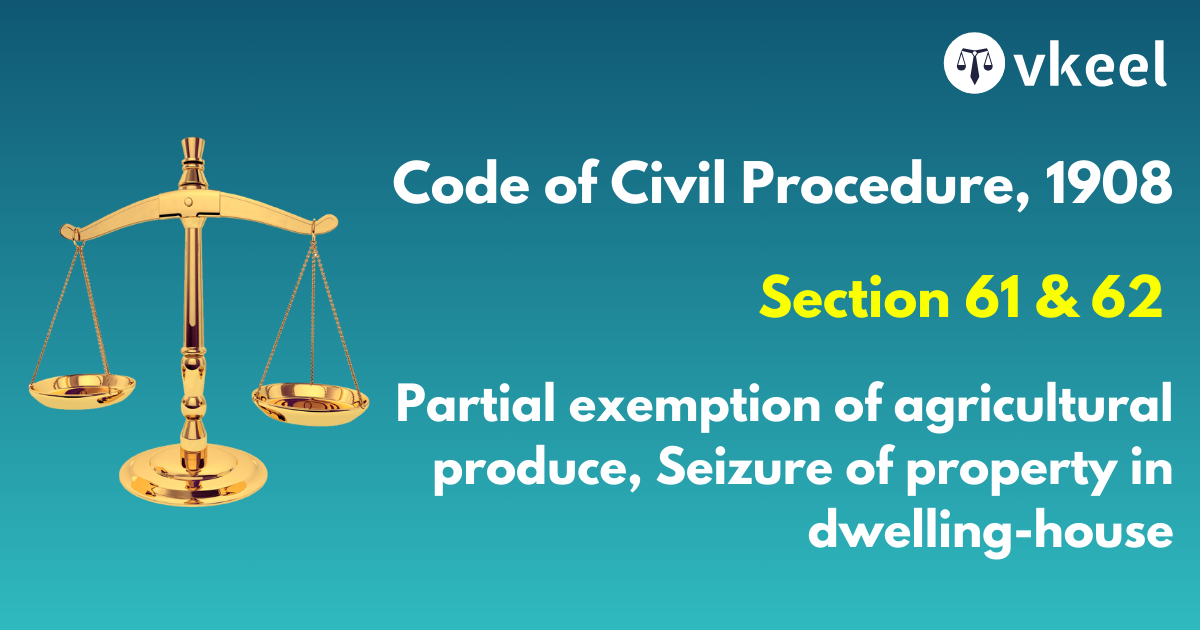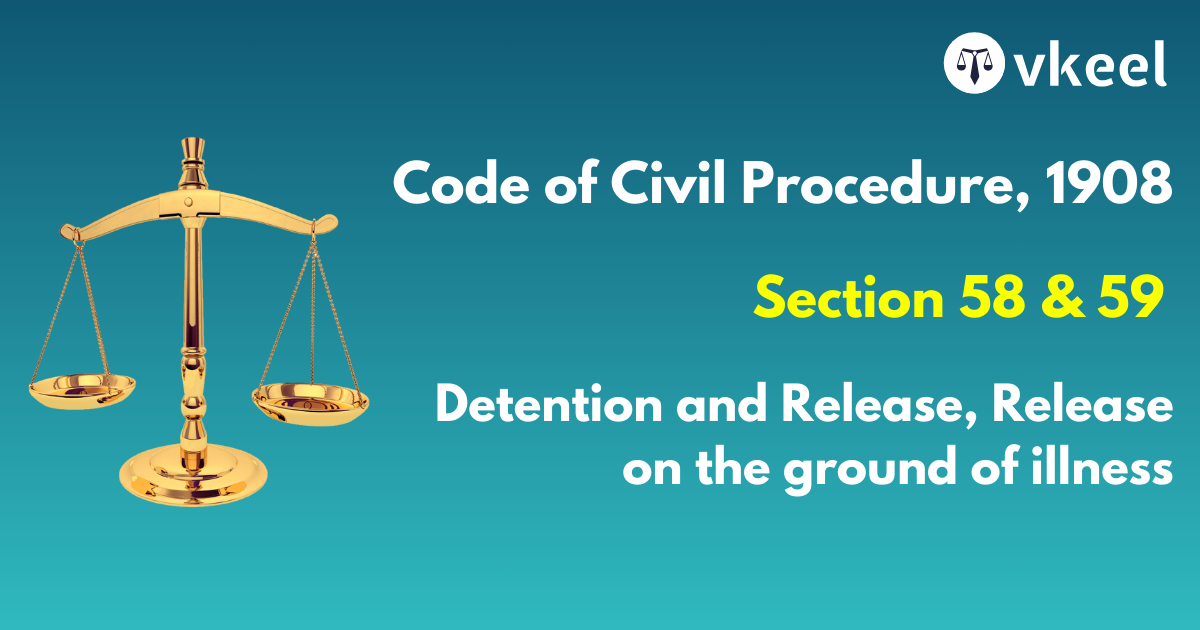Section 60 of the Code of Civil Procedure, 1908
By Joy Puri
Introduction
The Section 60 of the Code of Civil Procedure talks about the properties which are allowed to be attached and sold in order to satisfy the decree passed by the respective court.
Furthermore, the Section 60 of the Code of Civil Procedure ordains about the detailed list of the properties which are permitted to be seized.
Section 60 of the Code of Civil Procedure,1908
Property liable to attachment and sale in execution of decree.
(1) The following property is liable to attachment and sale in execution of a decree, namely, lands, houses or other buildings, goods, money, bank-notes, cheques, bills of exchange, hundis, promissory notes, Government securities, bonds or other securities for money, debts, shares in a corporation and, save as hereinafter mentioned, all other saleable property, movable or immovable, belonging to the judgment-debtor, or over which, or the profits of which, he has a disposing power which he may exercise for his own benefit, whether the same be held in the name of the judgment-debtor or by another person in trust for him or on his behalf:
Provided that the following particulars shall not be liable to such attachment or sale, namely:
(a) the necessary wearing-apparel, cooking vessels, beds and bedding of the judgment-debtor, his wife and children, and such personal ornaments as, in accordance with religious usage, cannot be parted with by any woman;
(b) tools of artisans, and, where the judgment-debtor is an agriculturist, his implements of husbandry and such cattle and seed-grain as may, in the opinion of the Court, be necessary to enable him to earn his livelihood as such, and such portion of agricultural produce or of any class of agricultural produce as may have been declared to be free from liability under the provisions of the next following section;
(c) houses and other buildings (with the materials and the sites thereof and the land immediately appurtenant thereto and necessary for their enjoyment) belonging to 2 [an agriculturist or a labourer of a domestic servant] and occupied by him ;
(d) books of account ;
(e) a mere right to sue for damages ;
(f) any right of personal service ;
(g) stipends and gratuities allowed to pensioners of the Government 3 [or of a local authority or of any other employer], or payable out of any service family pension fund 4 notified in the Official Gazette by 5 [the Central Government or the State Government] in this behalf, and political pensions;
6 [(h) the wages of labourers and domestic servants, whether payable in money or in kind;
7 ***
8 [(i) salary to the extent of 9 [the first 10 [one thousand rupees] and two third of the remainder] 11[in execution of any decree other than a decree for maintenance]:
12[Provided that where any part of such portion of the salary as is liable to attachment has been under attachment, whether continuously or intermittently, for a total period of twenty-four months, such portion shall be exempt from attachment until the expiry of a further period of twelve months, and, where such attachment has been made in execution of one and the same decree, shall, after the attachment has continued for a total period of twenty-four months, be finally exempt from attachment in execution of that deeree.]]
13[(ia) one-third of the salary in execution of any decree for maintenance;]
13[(j) the pay and allowances of persons to whom the Air Force Act, 1950 (45 of 1950) or the Army Act, 1950 (46 of 1950), or the Navy Act, 1957 (62 of 1957), applies;]
(k) all compulsory deposits and other sums in or derived from any fund to which the Provident Funds Act, 14[1925], (19 of 1925), for the time being applies in so far as they are declared by the said Act not to be liable to attachment;
9[(ka) all deposits and other sums in or derived from any fund to which the Public Provident Fund Act, 1968 (23 of 1968), for the time being applies, in so far as they are declared by the said Act as not to be liable to attachment;
(kb) all moneys payable under a policy of insurance on the life of the judgment debtor;
(kc) the interest of a lessee of a residential of building to which the provisions of law for the time being in force relating to control of rents and accommodation apply;]
15 [(1) any allowance forming part of the emoluments of any 16 [servant of the 17 [Government]] or of any servant of a railway company or local authority which the 18 [appropriate Government] may by notification in the Official Gazette declare to be exempt from attachment, and any subsistence grant or allowance made to 19 [any such servant] while under suspension;]
(m) an expectancy of succession by survivorship or other merely contingent or possible right or interest
(n) a right to future maintenance;
(o) any allowance declared by 20 [any Indian law] to be exempt from liability to attachment or sale in execution of a decree, and
(p) where the judgment-debtor is a person liable for the payment of land-revenue, any movable property which, under any law for the time being applicable to him, is exempt from .sale for the recovery of an arrear of such revenue.
21 [Explanation 1. The moneys payable in relation to the matters mentioned in clauses (g), (h), (i), (ia), (j), (l) and (o) are exempt from attachment or sale, whether before or after they are actually payable, and, in the case of salary, the attachable portion thereof is liable to attachment whether before or after it is actually payable.]
22 [ 23 [Explanation II– In clauses (i) and (ia)], “salary” means the total monthly emoluments, excluding any allowance declared exempt from attachment under the provisions of clause (1), derived by a person from his employment whether on duty or on leave.]
24[Explanation 25[III] — In clause (1) appropriate Government means–
(i) as respects any 26[person] in the service of the Central Government, or any servant of 27[a Railway Administration] or of a cantonment authority or of the port authority of a major port, the Central Government;
28* * * * *
(iii) as respects any other 18 [servant of the 16 [Government]] or a servant of any other 29*** local authority, the State Government.]
29[Explanation IV.– For the purposes of this proviso, ” wages” includes bonus, and “abourer” includes a skilled unskilled or semi-skilled labourer.
Explanation V .– For the purposes of this proviso, the expression agriculturist means a person who cultivates land personally and who depends for his livelihood mainly on the income from agricultural land, whether as owner, tenant, partner or agricultural labourer.
30Explanation VI.– For the purposes of Explanation V an agriculturist shall be deemded to cultivate land-personally, if he cultivates land
(a) by his own labour, or
(b) by the labour of any member of his family, or
(c) by servants or labourers on wages payable in cash or in kind (not being as a share of the produce), or both.]
29[(IA) Notwithstanding anything contained in any other law for the time being in force, an agreement by which a person agrees to waive the benefit of any exemption under this section shall be void.]
(2) Nothing in this section shall be deemed 31 *** to exempt houses and other buildings (with the materials and the sites thereof and the lands immediately appurtenant thereto and necessary for their enjoyment) from attachment or sale in execution of decrees for rent of any such house, building, site or land 31***
32* * * * *
STATE AMENDMENTS
Kerala
In clause (g) of the Proviso to sub-section (1) of section 60, after the words stipends and gratuities allowed by pensioners of the Government the words or of a local authority shall be inserted.
[Vide Kerala Act 13 of 1957, sec. 3.]
In the proviso to sub section (1) of section 60 of the Code of Civil Procedure, 1908 (Central Act 5 of 1908), after clause (g), the following clause shall be inserted, namely: —
“(gg) all moneys payable to the beneficiaries under the Family Benefit Scheme for the employees of the Government of Kerala.”
[Vide Kerala Act 1 of 1988, sec. 2.]
STATE AMENDMENTS
Himachal Pradesh
Amendment in section 60. — (1) In Section 60 sub-section (1):
(i) at the end of clause (c), add the following:
or compensation paid for such houses and buildings (including compensation for the materials and the sites and the land referred to above) acquired for a public purpose;
(ii) after clause (c), the following clause shall be inserted, namely: —
(cc) compensation paid for agricultural lands belonging to agriculturists and acquired for a public purpose;
[Vide Himachal Pradesh Act 6 of 1956, sec. 2.]
STATE AMENDMENTS
Tamil Nadu
Amendment of section 60, Central Act V of 1908.–In clause (g) of the proviso to sub-section (1) of section 60 of the Code of Civil Procedure, 1908, after the words “stipends and gratuities allowed to pensioners of the Government”, the words “or of a authority” shall be inserted.
[Vide Tamil Nadu Act XXXIV of 1950, s. 2]
Rajasthan
Amendment of section 60, Central Act V of 1908.-In clause (b) of the proviso to sub-section (1) of section 60 of the code of Civil Procedure, 1908 (Central Act V of 1908) in its application to the State of Rajasthan, after the word, “agriculturist” the words “his milch cattle and those likely to calve within two years” shall be inserted.
[Vide Rajasthan Act 19 of 1958, s. 2]
Amendment of section 60, Central Act V of 1908.- In the proviso to sub-section (1) of section 60 of the Code of Civil Procedure, 1908 (Central Act V of 1908) in the application thereof to the State of Rajasthan,-
(i) after clause (k), the following clause shall be inserted, namely:-
(kk) moneys payable under Life Insurance Certificates issued in pursuance of the Rajasthan Government Servants Insurance Rules, 1953; and
(ii) after explanation 3 the following explanation shall be inserted, namely:-
Explanation 4.-Where any money payable to a Government servant of the State is exempt from attachment under the provision contained in clause (kk), such money shall remain exempt from attachment notwithstanding the fact that owing to the death of a Government servant it is payable to some other person.
[Vide Rajasthan Act 16 of 1957, s. 2]
Uttar Pradesh
Amendment of section 60, Central Act V of 1908.- In the proviso to sub-section (1) of section 60 of the Code of Civil Procedure, 1908 (Central Act V of 1908) in the application thereof to the State of Rajasthan
(i) after clause (k), the following clause shall be inserted, namely:-
(kk) moneys payable under Life Insurance Certificates issued in pursuance of the Rajasthan Government Servants Insurance Rules, 1953; and
(ii) after explanation 3 the following explanation shall be inserted, namely:-
“Explanation 4.-Where any money payable to a Government servant of the State is exempt from attachment under the provision contained in clause (kk), such money shall remain exempt from attachment notwithstanding the fact that owing to the death of a Government servant it is payable to some other person.”
[Vide Rajasthan Act 16 of 1957, s. 2]
Uttar Pradesh
Addition of explanation (1-A) to sub-section (1) of section 60.– After Explanation (1) of sub-section (1) of section 60 of the Code of Civil Procedure, 1908, insert the following Explanation (I-A) ;
“Explanation (I-A) Particulars mentioned in clause (c) are exempt from sale in execution of a decree whether passed before or after the commencement of the Code of Civil Procedure (United Provinces Amendment) Act, 1908, for enforcement of a mortgage or charge thereon”.
[Vide Uttar Pradesh Act XXXV of 1948, s. 2]
Landmark Case Laws
Punjab National Bank Vs Orkids, 2000
An equitable mortgage by deposit of title deeds is like any other mortgage, the subsequent purchaser cannot have any priority over such a mortgage created before the sale, cannot raise objection that the property cannot be attached in satisfaction of the decree in favour of the holder of equitable mortgage, by virtue of section 60.
K Murugesan Vs E Ulaganathan, 2009
Retrial benefits are not liable for attachment not only while they were with the employer concerned, but also when it passes to the hands of the employee after retirement, since such benefits will not lose their character as retiral benefits entitling them to be clothed with exemption under section 60(1)(g) of CPC.
Devayya Vs M Ganapati,1974
For wrongful attachment the judgment-creditor and all other persons who aided or abeted him in the commission of such tort, or who acted as accessories or who acted in concert in its commission would be jointly and severally liable to pay damages.
Conclusion
To conclude, the Section 60 of the Code of Civil Procedure builds certain kind of space and balance between the rights of the creditors and the protection of debtors.
The rights of the debtor are protected in such a way that the essential properties are not attached to satisfy the decree.
Disclaimer:
The information provided in the article is for general informational purposes only, and is not intended to constitute legal advice or to be relied upon as a substitute for legal advice. Furthermore, any information contained in the article is not guaranteed to be current, complete or accurate. If you require legal advice or representation, you should contact an attorney or law firm directly. We are not responsible for any damages resulting from any reliance on the content of this website.

